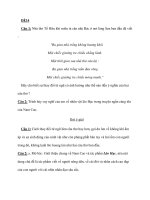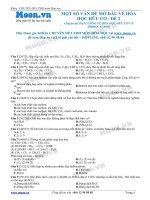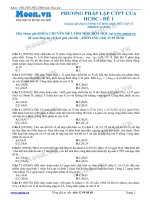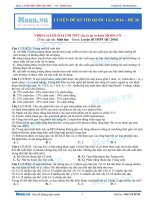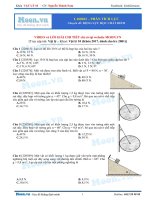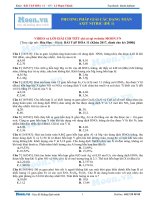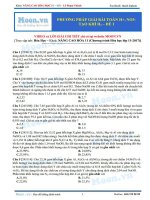- Trang chủ >>
- THPT Quốc Gia >>
- Ngoại Ngữ
ThiOnline DeThiThuDHTiengAnh(GiaiText) de14
Bạn đang xem bản rút gọn của tài liệu. Xem và tải ngay bản đầy đủ của tài liệu tại đây (221.19 KB, 7 trang )
KHÓA LUYỆN GIẢI ĐỀ THI ĐẠI HỌC
ĐỀ THI THỬ ĐẠI HỌC TIẾNG ANH (GIẢI TEXT) – ĐỀ 14
(thi online)
I. Mark the letter A, B, C or D on your answer sheet to indicate the word whose underlined part is
pronounced differently from that of the rest in each of the following questions.
Câu 1:
Câu 2:
Câu 3:
Câu 4:
Câu 5:
A: chicken
A: leave
A: plays
A: scissors
A: knife
B: character
B: instead
B: says
B: sense
B: twice
C: chew
C: heap
C: receives
C: sugar
C: hive
D: watch
D: meat
D: students
D: soft
D: skip
II. Mark the letter A, B, C or D on your answer sheet to indicate the word that differs from the rest
in position of the main stress in each of the following questions.
Câu 1:
Câu 2:
Câu 3:
Câu 4:
Câu 5:
A: specific
A: divide
A: director
A: perform
A: intelligent
B: achievement
B: suspect
B: machinery
B: reaction
B: population
C: alteration
C: succeed
C: encourage
C: critical
C: opportunity
D: observe
D: multiply
D: excellent
D: solution
D: economics
III. Mark the letter A, B, C or D on your answer sheet to indicate the correct answer to each of the
following questions.
Câu 1: ______ his illness, John continued to play rugby.
A: Despite
B: Although
C: Even though
D: But
Câu 2: None of the students ______ a car.
A: has
B: have
C: have got
D: have had
Câu 3: ______ Chinese is more difficult to learn than English.
A It is certain that
B: Certain it is that
C: Certainly is
D: Certain is it that
Câu 4: ______ in a home where two parents work is a difficult task indeed.
A: Children brought up
B: To bring up children
C: Bringing up children
D: Bring up children
Câu 5: There are still factors that make ______ at work hard to achieve.
A: equality
B: equal
C: equation
D: inequality
Câu 6: My uncle was loved by the local people for his ______ and care for people.
A: humane
B: humorous
C: humility
D: kind-hearted
Câu 7: The boy was ______ for his power to overcome his disabilities and become a successful
businessman.
A: gifted
B: remarkable
C: marvelous
D: wonderful
Câu 8: As soon as she arrived home, she ______ her shoes and put on her slippers.
A: took off
B: undressed
C: put off
D: took away
Hotline: 04.32.99.98.98
KHÓA LUYỆN GIẢI ĐỀ THI ĐẠI HỌC
Câu 9: Your brother is intelligent but he ______ common sense.
A: fails
B: wants
C: lacks
D: misses
Câu 10: Don’t______ that! I will break!
A touch
B: taste
C: smell
D: feel
Câu 11: When Mary returned to the meeting place, all her friends ______ .
A have left
B: had gone
C: were going
D: had been leaving
Câu 12: Minh ______ been at the supermarket this afternoon. I was with him in the library.
A must have
B: could have
C: can’t have
D: might not have
Câu 13: Jane never thinks about anyone but herself. She’s a bit ______.
A selfish
B: silly
C: arrogant
D: bossy
Câu 14: To be a senior manager, you have to ______ a lot of responsibility.
A get
B: bear
C: stand
D: convey
Câu 15: How can huge tree grow from such ______ seeds? It’s difficult to understand.
A big
B: large
C: little
D: tiny
Câu 16: Statistics shows that the way people live ______ the way they eat.
A decides
B: means
C: indicates
D: determines
Câu 17: The manager expected the team ______ because they had done a lot of training.
A to win
B: have won
C: to be won
D: wining
Câu 18: Don’t______ at people. It is not very polite!
A look
B: stare
C: glance
D: gaze
Câu 19: He completely ______ with everything that had been said at the meeting.
A accepted
B: agreed
C: approved
D: admitted
Câu 20: Remember to lock the door when you ______.
A leave
B: will leave
C: left
D: leaving
Câu 21: He is the man ______ daughter won the Beauty Contest last year.
A who
B: whose
C: that
D: his
Câu 22: There was ______ rain yesterday that several roads were flooded.
A too many
B: so much
C: so many
D: too much
Câu 23: China was ______ population of all the countries in the world.
A the larger
B: the least
C: the largest
D: more
Câu 24: I ______ to Hanoi, the capital, several times.
A have been going
B: have gone
C: have been gone
D: have been
Hotline: 04.32.99.98.98
KHÓA LUYỆN GIẢI ĐỀ THI ĐẠI HỌC
Câu 25: ______ enough time to talk over the matter now.
A It hasn’t
B: There isn’t
C: There hasn’t
D: It isn’t
Câu 26: The little boy ______ having taken the money on the counter.
A refused
B: denied
C: suggested
D: said
Câu 27: At first, only a few children ______ the special class as the parents didn’t think their children
could learn anything.
A arrived
B: went
C: studied
D: attended
Câu 28: She ______ as a teacher in a school for the blind in the city center.
A earns
B: works
C: is
D: are
Câu 29: Although technology has made life easier in the home, it is not necessary the ______ happiness.
A way
B: point
C: factor
D: key
Câu 30: The delicious ______ of cooking coming from the kitchen made us feel hungry.
A look
B: sight
C: taste
D: smell
IV. Choose A, B, C or D for each of the following blanks:
MUSIC
Nobody knows for certain what the origin of music was. Music is certainly older than poetry and painting
but as early man had no way of (1) _________ it, we can only guess what it sounded like. Watching a
child (2) _________ on drum with his hands or a piece of wood, it is easy to see that this is the simplest of
instruments. It does not (3) _________ much effort to product a rhythm on it. Wall paintings show what
some of the first instrument looked like. Early civilizations has already discovered the three basic (4)
_________ of producing music: blowing into a tube, striking an object, and scraping a string. We know
that western music comes from the (5) _________ Greeks. The musical scales we use now are (6)
_________ on certain sequences of notes which the Greeks used to create a particular (7) _________.
Until the sixteenth century, most players of instruments were performers, but as music became more (8)
_________, orchestras and musical groups began to (9) ___. This (10) ____ about the writing of music to
be played by several musicians at one time. This can certainly be called the birth of modern music.
Câu 1:
Câu 2:
Câu 3:
Câu 4:
Câu 5:
Câu 6:
Câu 7:
Câu 8:
Câu 9:
Câu 10:
A recording
A hitting
A make
A forms
A ancient
A raised
A spirit
A widespread
A turn
A produced
B: playing
B: knocking
B: call
B: manners
B: old
B: based
B: temper
B: enlarged
B: appear
B: affected
C: producing
C: crashing
C: take
C: systems
C: aged
C: established
C: mood
C: expanded
C: spring
C: caused
D: performing
D: banging
D: do
D: ways
D: antique
D: supported
D: humor
D: extended
D: be
D: brought
V. Read the following pasage carefully and choose the best answer for each question:
Very few people in the modern world obtain their food supply by hunting and gathering in the natural
environment surrounding their homes. This method of harvesting from nature’s provision is the oldest
known subsistence strategy and has been practised for at least the last two million years. It was, indeed,
Hotline: 04.32.99.98.98
KHÓA LUYỆN GIẢI ĐỀ THI ĐẠI HỌC
the only way to obtain food until rudimentary farming and the domestication of wild animals were
introduced about 10,000 years ago.
Because hunter-gatherers have fared poorly in comparison with their agricultural cousins, their numbers
have dwindled, and they have been forced to live in marginal environments, such as deserts and arctic
wastelands. In higher latitudes, the shorter growing seasons have restricted the availability of plant life.
Such conditions have caused a greater dependence on hunting, and on fishing along the coasts and
waterways. The abundance of vegetation in the lower latitudes of the tropics, on the other hand, has
provided a greater opportunity for gathering a variety of plants. In short, the environmental differences
have restricted the diet and have limited possibilities for the development of subsistence societies.
Contemporary hunter-gatherers may help us understand our prehistoric ancestors. We know from the
observation of modern hunter-gatherers in both Africa and Alaska that a society based on hunting and
gathering must be very mobile. While the entire community camps in a central location, a smaller party
harvests the food within a reasonable distance from the camp. When the food in the area has become
exhausted, the community moves on to exploit another site. We also notice seasonal migration patterns
evolving for most hunter-gatherers, along with a strict division of labor between the sexes. These patterns
of behavior may be similar to those practised by mankind during the Paleolithic Period .
Câu 1: The word “domestication” in the first paragraph mostly means .
A teaching animals to do a particular job or activity in the home
B: hatching and raising new species of wild animals in the home
C: making wild animals used to living with and working for humans
D: adapting animals to suit a new working environment
Câu 2: According to the passage, subsistence societies depend mainly on .
A agricultural products
B: hunter-gatherers’ tools
C: nature’s provision
D: farming methods
Câu 3: The word “marginal” in the second paragraph is closest in meaning to ____.
A suburban
B: abandoned
C: forgotten
D: Disadvantaged
Câu 4: In the lower latitudes of the tropics, hunter-gatherers
A have better food gathering from nature
B: can free themselves from hunting
C: harvest shorter seasonal crops
D: live along the coasts and waterways for fishing
Câu 5: According to the passage, studies of contemporary subsistence societies can provide a
A broader vision of prehistoric natural environments
B: deeper insight into the dry-land farming
C: further understanding of modern subsistence societies
D: further understanding of prehistoric times
Câu 6: The word “conditions” in the second paragraph refers to
A the environments where it is not favorable for vegetation to grow
B: the situations in which hunter-gatherers hardly find anything to eat
C: the places where plenty of animals and fish can be found
D: the situations in which hunter-gatherers can grow some crops
Câu 7: A typical feature of both modern and prehistoric hunter-gatherers is that .
A they don’t have a strong sense of community
B: they live in the forests for all their life
C: they don’t have a healthy and balanced diet
D: they often change their living places
Câu 8: According to the passage, which of the following is NOT mentioned?
A Hunting or fishing develops where there are no or short growing seasons.
B: The environmental differences produce no effect on subsistence societies.
C: Harvesting from the natural environment had existed long before farming was taken up.
D: The number of hunter-gatherers decreases where farming is convenient.
Hotline: 04.32.99.98.98
KHÓA LUYỆN GIẢI ĐỀ THI ĐẠI HỌC
Câu 9: According to the author, most contemporary and prehistoric hunter-gatherers share
A only the way of duty division
B: some patterns of behavior
C: some restricted daily rules
D: some methods of production
VI. Read the following passage and mark the letter A, B, C or D on your answer sheet to indicate
the correct answer for each of the questions.
The lens on a camera has only two tasks. First, it must gather in as much light as possible in order to
activate the sensitive chemicals on the film. Second, it must organize the light rays so that they form a
sharp image on the film. These may sound like simple tasks, but they are not.
One of the sharpest lenses is merely a pinhole in a sheet of cardboard, metal, plastic, or a similar material.
If the pinhole is tiny enough, the image can be quite sharp, but then very little light is admitted. For most
purposes, even the most sensitive film would take too long to record an image.
A glass lens is much better because it lets in much more light and focuses it on the film. Yet simple glass
lenses are sharpest only in their centers. As more of the les is used, the image suffers in sharpness.
One reason a simple lens can cause problems is that it is shaped like a section of a sphere. Spherical lenses
do not focus perfectly on flat film, so the image is slightly distorted, especially at the edges. Another
reason is that the lens can act partly like a prism. This means that some of the colors in the image will not
focus properly, and the image will be fuzzy.
One solution is to block off all but the sharp-focusing center of the lens. If you block off the edges of the
lens, however, less light will get to the film. Early lenses had to compromise between sharpness and lightgathering power.
Very sharp lenses that admit as much light as possible can be built by making them with several separate
lenses, or elements. A multiple-element lens has from two to nine separate lenses. Some elements are
cemented together, and some have a gap between them. Furthermore, the elements are often made of
different kinds of glass, each with a different ability to bend light rays. Some of the elements are there just
for correcting problems caused by the other elements! The results are worth it, though: pictures can be
taken in many different light conditions, and they have a sharpness you can almost feel.
Câu 1: The word It in the first paragraph refers to:
A Camera
B: Lens
C: Film
D: Chemicals
Câu 2: The word distorted in the fourth paragraph means:
A Out of a proper or natural relation
B: Clean and in shape
C: Purified, as one
D: Proper
Câu 3: In what ways does an image suffer if too large an area of the spherical lens is used?
A The edges of the image become fuzzy
B: Too much light is admitted
C: Too little light is admitted
D: Colors change
Câu 4: What is the main disadvantage of a simple lens that is made sharp by using the center?
A With less light-gathering power, the lens is utterly useless.
B: With less light-gathering power, the lens is useful only in bright light.
C: With more light-gathering power, the lens is useful only in dim light.
D: With more light-gathering power, the lens is utterly useless.
Câu 5: The word sharpest in the third paragraph is closest in meaning to:
A Having clear form and detail
B: Terminating in an edge or a point
C: Intellectually penetrating; astute
D: Having a thin edge or a fine point suitable for or capable of cutting or piercing
Hotline: 04.32.99.98.98
KHÓA LUYỆN GIẢI ĐỀ THI ĐẠI HỌC
Câu 6: The word sensitive in the second paragraph could be best be replaced by the word:
A Delicate
B: Irritable
C: Reactive
D: Psychic
Câu 7: The word ability in the sixth paragraph could best be replace by the word:
A Ignorance
B: Weakness
C: Ineptness
D: Capacity
Câu 8: The meaning of the word solution as used in the fifth paragraph is closest in meaning to:
A A homogeneous mixture of two or more substances, which may be solids, liquids, gases, or a
combination of these
B: The answer to or disposition of a problem
C: The state of being dissolved
D: Release; deliverance; discharge
Câu 9: What is the minimum number of lenses in multiple-element lens?
A Nine
B: Two
C: Ninety-two
D: Twenty-nine
Câu 10: The word fuzzy in the fourth paragraph means:
A Clear
B: Unclear
C: Exact
D: Precise
Câu 11: The word admitted in the sixth paragraph is closest in meaning to:'
A To permit to enter
B: To have room for; accommodate
C: To grant to be real, valid, or true; acknowledge
D: To make acknowledge
VII. Mark the letter A, B, C, or D on your answer sheet to show the underlined part that needs
correction.
Câu 1: Haft of her salary is spent on rent a flat.
A Haft of
B: salary
C: on
D: rent
Câu 2: Your homework must to be done before class.
A homework
B: to be
C: done
D: class
Câu 3: On the floor of the Pacific Ocean is hundreds of flat-topped mountains more than a mile beneath
sea level.
A the floor
B: is
C: flat-topped
D: beneath
Câu 4: More than a half of the children in the district qualifies for reduced-price or free lunches.
A More than
B: of the
C: qualifies
D: reduced-price
Câu 5: It’s essential that every student is present at the meeting.
A essential
B: every
C: studentis
D: is present
VIII. Choose the best sentence that is made from the words given.
Câu 1: it/ quiet/ you/ almost hear/ pin drop
A It was quite that you could almost hear a pin drop.
B: It was so quiet that you could almost hear a pin drop.
C: It was too quite that you could almost hear a pin drop.
D: It was so quite that you could almost hear a pin drop.
Hotline: 04.32.99.98.98
KHÓA LUYỆN GIẢI ĐỀ THI ĐẠI HỌC
Câu 2: never/ I/ dream/ such/ good results.
A Never have I dreamt of such good results.
B: Never do I dream of such good results.
C: Never have I dreamt such good results.
D: Never I have dreamt of such good results.
Câu 3: I/ come/ party/ I/ have/ go/ somewhere else
A I’d love to come to your party as I have to go somewhere else.
B: I’d love come to your party but I have to go somewhere else.
C: I come to your party but I have to go somewhere else.
D: I’d love to come to your party but I have to go somewhere else.
Câu 4: he/ tell/ very/ amuse/ story
A He told us a very amusing story.
B: He told us a very amused story.
C: He tells us very amusing story.
D: He told us very amusing story.
Câu 5: robbers/ see/ wander/ near/ bank
A The robbers were seen wander near bank.
B: The robbers were seen wandering near the bank.
C: The robbers were seen to wandering near the bank.
D: The robbers were seen they to wander near the bank.
Hotline: 04.32.99.98.98
